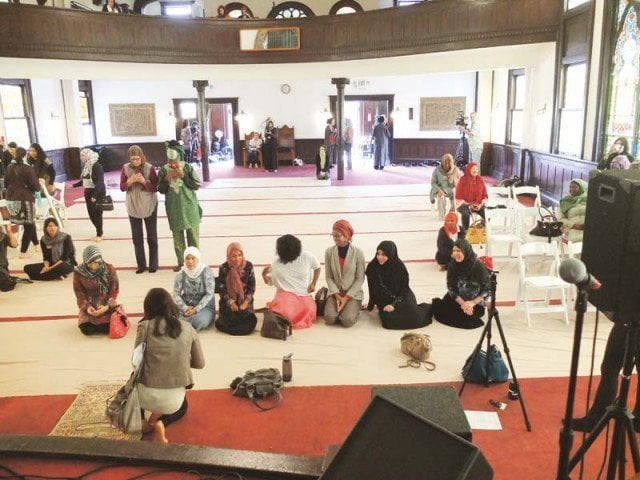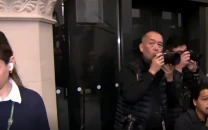Muslim organisation in US calls for women-friendly mosques
Organisation also recommends removal of physical barriers in halls to separate men and women

Women stream into the space before the Jumma prayers begin. PHOTOS SAEED RAHMAN
ISNA, the largest and oldest umbrella organisation for Sunnis in North America, referred multiple times to the Holy Quran and to hadith to support their claim that women should be welcomed in mosques. The group also boasts support from the Fiqh Council of North America, an organisation composed of renowned and respected Islamic scholars.
Read: Muslim group to consult on plans for Britain's first women's mosque
“The general guideline was set by Prophet Muhammad (pbuh)when he ordered that women be allowed to freely attend the masjid: ‘If the wife of anyone of you asks permission to attend the masjid, he should not prevent her,’” the statement read.
“Thus we call on all our masjids to be welcoming to women -- such that their experience at the masjid be uplifting and not demeaning. To realise the ideal of being welcoming to women, masjids should (a) ensure that women’s accommodations are comfortable, clean and well-lit; (b) support and facilitate women’s activities and groups; and (c) proclaim clearly on the minbar [or pulpit] and by other means that women are an integral part of the masjid,” the statement added.
ISNA also called for women to have access to the main hall of mosques, called musallas, and even recommended that there should not be physical barriers in these halls to separate men and women.
Muslim feminist Hind Makki, who was part of an ISNA task force dedicated to creating women-friendly mosques, feels that the last part of the statement would be the most challenging principle for mosques to adapt.
"Space is always an issue for mosques in the US. People will say it is incumbent on men to pray at the mosque, but it's not incumbent on the women, which is true. But then they make the leap to say that men's spaces should be prioritised over women's spaces. That's the fight I'm anticipating," Makki said.
The 2011 American Mosque Report found that 66 per cent of the 2,106 mosques surveyed used dividers to separate women's prayers spaces during daily prayers. According to Makki, "The prayer experiences of many Muslim women are too often frustrating; mosques seem to be built to cater only to the male experience.”
Makki further informed that ISNA will launch the campaign at its annual convention next month and also establish community forums to educate mosque leadership.
Read: Women’s Mosque of America: Come as you are
Dr Amina Wadud, a visiting scholar at the Starr King School for the Ministry, who stirred controversy in 2005 by leading a mixed-gender congregational prayer told HuffPost that the ISNA statement was quite significant and a "good first step."
"I think they have responded well to the community's needs. I'm hopeful that it will make a difference and that we'll be able to see that difference,” she continued.
M Hasna Maznavi, founder and president of The Women's Mosque, told HuffPost that ISNA's move towards women-friendly worship spaces should be "celebrated and supported." The Women's Mosque of America, based in Los Angeles, offers Friday prayers for a congregation composed of just women and children. Women are allowed to recite the call to prayer, deliver sermons and have direct access to imams by sitting in the front row.
However, Maznavi is not so hopeful that the campaign will bear fruit. "I'm afraid that while it shows progress, it only helps an already privileged class of women who are already current mosque-goers, and it does not address the concerns of unmosqued Muslim women. ISNA has been working toward women-friendly mosque reform for many years, but change has been incredibly slow because policies and statements don't easily translate into action or a change in societal behavior."
This article originally appeared on Huffington Post



















COMMENTS
Comments are moderated and generally will be posted if they are on-topic and not abusive.
For more information, please see our Comments FAQ